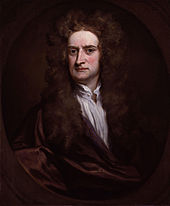The greatest genius of all times was an Englishman. He formulated at the age 23 - 24 properties of light, Calculus, Law of Gravitation and newton's law of motion.He also corrected Keplers Laws.
Early life
Isaac Newton was born according to the Julian calendar (in use in England at the time) on Christmas Day, 25 December 1642 (NS 4 January 1643[1]), at Woolsthorpe Manor inWoolsthorpe-by-Colsterworth, a hamlet in the county of Lincolnshire. He was born three months after the death of his father, a prosperous farmer also named Isaac Newton. Born prematurely, he was a small child; his mother Hannah Ayscough reportedly said that he could have fit inside a quart mug.[7] When Newton was three, his mother remarried and went to live with her new husband, the Reverend Barnabas Smith, leaving her son in the care of his maternal grandmother, Margery Ayscough. The young Isaac disliked his stepfather and maintained some enmity towards his mother for marrying him, as revealed by this entry in a list of sins committed up to the age of 19: "Threatening my father and mother Smith to burn them and the house over them."[8] Newton's mother had three children from her second marriage.[9]
From the age of about twelve until he was seventeen, Newton was educated at The King's School, Grantham which taught Latin and Greek but no mathematics. He was removed from school, and by October 1659, he was to be found at Woolsthorpe-by-Colsterworth, where his mother, widowed for a second time, attempted to make a farmer of him. Newton hated farming.[10] Henry Stokes, master at the King's School, persuaded his mother to send him back to school so that he might complete his education. Motivated partly by a desire for revenge against a schoolyard bully, he became the top-ranked student,[11] distinguishing himself mainly by building sundials and models of windmills.[12]
In June 1661, he was admitted to Trinity College, Cambridge, on the recommendation of his uncle Rev William Ayscough. He started as a subsizar—paying his way by performing valet's duties—until he was awarded a scholarship in 1664, which guaranteed him four more years until he would get his M.A.[13] At that time, the college's teachings were based on those of Aristotle, whom Newton supplemented with modern philosophers such as Descartes, and astronomers such as Galileo and Thomas Street, through whom he learned of Kepler's work. He set down in his notebook a series of 'Quaestiones' about mechanical philosophy as he found it. In 1665, he discovered the generalised binomial theorem and began to develop a mathematical theory that later became calculus. Soon after Newton had obtained his B.A. degree in August 1665, the university temporarily closed as a precaution against the Great Plague. Although he had been undistinguished as a Cambridge student,[14] Newton's private studies at his home in Woolsthorpe over the subsequent two years saw the development of his theories on calculus,[15]optics, and the law of gravitation.
In April 1667, he returned to Cambridge and in October was elected as a fellow of Trinity.[16][17] Fellows were required to become ordained priests, although this was not enforced in the restoration years and an assertion of conformity to the Church of England was sufficient. However, by 1675 the issue could not be avoided and by then his unconventional views stood in the way.[18] Nevertheless, Newton managed to avoid it by means of a special permission from Charles II (see "Middle years" section below).
His studies had impressed the Lucasian professor, Isaac Barrow, who was more anxious to develop his own religious and administrative potential (he became master of Trinity two years later), and in 1669, Newton succeeded him, only one year after he received his M.A. He was elected a Fellow of the Royal Society (FRS) in 1672
Fame
The mathematician Joseph-Louis Lagrange often said that Newton was the greatest genius who ever lived, and once added that Newton was also "the most fortunate, for we cannot find more than once a system of the world to establish."[100] English poet Alexander Pope was moved by Newton's accomplishments to write the famous epitaph:
Newton himself had been rather more modest of his own achievements, famously writing in a letter to Robert Hooke in February 1676:
Two writers think that the above quotation, written at a time when Newton and Hooke were in dispute over optical discoveries, was an oblique attack on Hooke (said to have been short and hunchbacked), rather than—or in addition to—a statement of modesty.[102][103] On the other hand, the widely known proverb about standing on the shoulders of giants, published among others by seventeenth-century poetGeorge Herbert (a former orator of the University of Cambridge and fellow of Trinity College) in his Jacula Prudentum (1651), had as its main point that "a dwarf on a giant's shoulders sees farther of the two", and so its effect as an analogy would place Newton himself rather than Hooke as the 'dwarf'.
In a later memoir, Newton wrote:
In 1816, a tooth said to have belonged to Newton was sold for £730 (us$3,633) in London to an aristocrat who had it set in a ring.The Guinness World Records 2002 classified it as the most valuable tooth, which would value approximately £25,000 (us$35,700) in late 2001. Who bought it and who currently has it has not been disclosed.
Albert Einstein kept a picture of Newton on his study wall alongside ones of Michael Faraday and James Clerk Maxwell. Newton remains influential to today's scientists, as demonstrated by a 2005 survey of members of Britain's Royal Society (formerly headed by Newton) asking who had the greater effect on the history of science, Newton or Einstein. Royal Society scientists deemed Newton to have made the greater overall contribution. In 1999, an opinion poll of 100 of today's leading physicists voted Einstein the "greatest physicist ever;" with Newton the runner-up, while a parallel survey of rank-and-file physicists by the site PhysicsWeb gave the top spot to Newton.


No comments:
Post a Comment